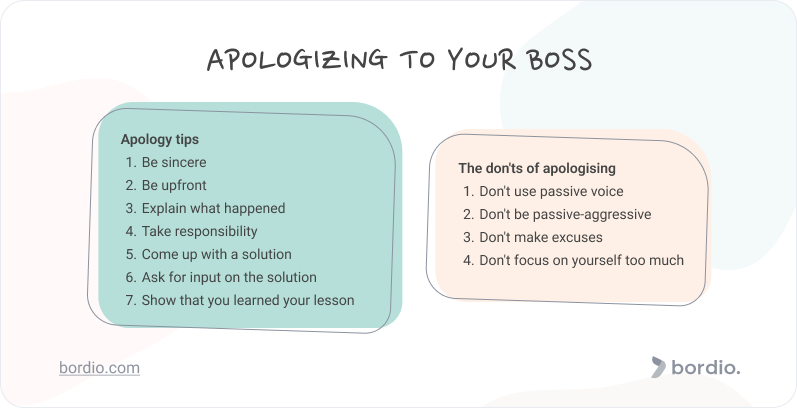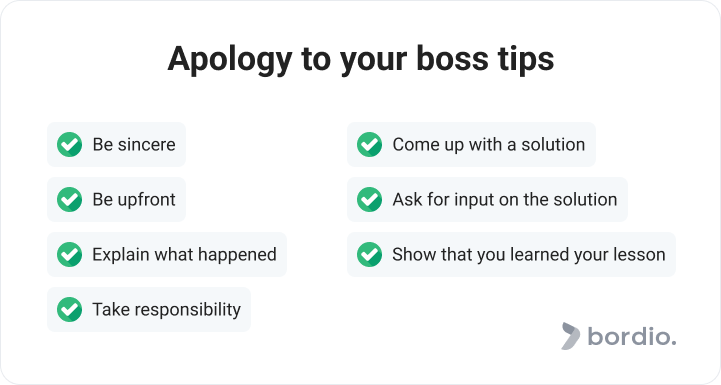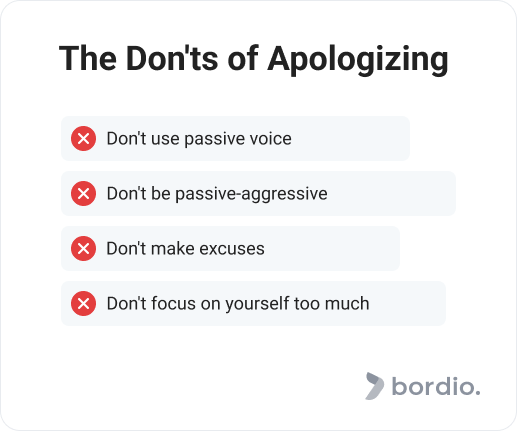Mistakes at work happen all the time. Someone forgets to log the task in their weekly planner and misses the deadline, messes up the report, or says something wrong at an important client’s meeting marked in the task planner online.
And while it’s uncomfortable and, sometimes, embarrassing, making a mistake is not the end of the world. We learn and we grow, and it’s unrealistic to think that you would be able to go through your professional life with zero failures.
But while it is okay to make a mistake, how we react to the mistake influences your future growth and can even affect your entire career. And to help you make the most of the bad situation, we prepared this guide to share the proven recommendations and actions that one needs to adapt to always come out of this experience as a winner.
When to apologize to your boss
Apologizing at the workplace can seem weird, uncomfortable, and even embarrassing.
Somehow, we are all forced into thinking that saying sorry makes you look weak, and the office is not a place for that anyway. We think that both statements are inherently wrong, and apologizing, in turn, is a sign of strength. It means that you are a mature professional who is ready to take accountability and learn.
When to apologize
Let’s talk more specifically about the situations when an apology is required:
- Your mistake has a significant effect on other operations and/or colleagues.
- Your actions caused disruption in the process.
- There are financial consequences of your mistake.
- You insulted or offended someone.
When not to apologize
Not every issue or error requires an apology. Here are a few examples of when it might not be necessary:
- The mistake is minor and has little to no effect on operations or your colleagues.
- You’ve spotted the mistake and fixed it before any damage was made.
- The mistake was made as a result of someone else’s error (e.g., someone sent you the wrong measurements of their apartment, so your design plan turned out inaccurate).
Remember that there might be legal repercussions to your actions at the workplace. If you feel like that could be your case, make sure you check in with the HR or legal department before issuing a formal apology.
Don’t exaggerate and over-apologize at work, especially if it’s for the little things that you don’t really need to feel sorry about. Not only will it make colleagues doubt your credibility and consider you insecure, but it’s also usually annoying to the people around you.
It’s important to have a balance between over-apologizing and not apologizing at all. Use your judgment and experience to define when an apology is needed.
What goes into an apology to your boss
Just saying that you’re sorry is not always enough. There is a whole science behind a good apology in the workplace.
There are several main components of an effective apology. You might not use them all, but they have a compound effect when applied together.
- Apologize sincerely and indicate your regret clearly. You should genuinely feel sorry.
- Be upfront and don’t try to hide or cover up your mistake. Apologize sooner rather than later. You might be hesitating and feeling uncomfortable, but the longer you postpone it the more difficult it will become. Plus, if it takes you too long your boss or project manager can assume you just don’t care.
- Explain what happened and your perspective but don’t start the blame game.
- Demonstrate that you are taking responsibility for your big mistake. Improving the team’s accountability is a constant battle for all project managers and team leaders. They will appreciate if you show that you keep yourself accountable without pressure or input from their side.
- Come up with a solution. How can you fix it and how can you prevent this from reoccurring? It’s important to indicate that you will do your best to not make the same mistake again.
- Ask for their help and input. Maybe your boss can double-check your plan or offer their perspective and alternative ideas during a 1-on-1 meeting.
- Indicate that you are willing to get better and win back the trust.
Remember to keep your word! If you said that you will be sending reports on time from now on, then do it. Set up seven notifications in your online calendar planner if that’s what it takes. Not staying true to your words is a much more serious offense than a mistake. Everyone makes mistakes, but those who don’t keep up with their promises don’t deserve second chances. Also if you are more organized and write everything down in your schedule maker it will help you not to make miscalculations for example with time. An organized employee planning your schedule is more useful, so use the simple online schedule builder from Bordio. It could also help using some free online planners instead of paper ones.
The don’ts of apologizing
Some might say that you can’t apologize the wrong way as long as you are genuinely sorry. It is partly true. However, how quickly you will be forgiven depends on the way you approach apologizing, so make sure you skip the don’ts of apologizing and smooth things over faster.
- Use active phrasing – I made a mistake, not – mistakes were made. Active phrasing confirms that you are taking ownership. Passive phrasing makes us doubt your sincerity on a subconscious level.
- Don’t be passive-aggressive by saying ‘if’ phrases – like ‘i’m sorry if my words hurt you’. They will only make the affected parties angry.
- Don’t make excuses too. Either you accept responsibility for your mistake or not. Excuses undermine your apology and make you look bad.
- Don’t focus too much on yourself and how you feel, otherwise, the other party will feel like you don’t truly care about inconveniencing them but instead worry about looking bad.
Remember about the four tips above and you will be able to apologize effectively for any error or mistake.
How to deliver an apology
Ideally, you would apologize in person when everyone has already calmed down, and you had time to think about what you want to say.
The second best option is to do a video call, but an apology email will suffice as well if other options are unavailable. If you can’t apologize in person, still suggest that you can meet later to discuss the issue further face-to-face. It’s more about being open to the dialogue than actually needing a follow-up meeting designated in the time planner online.
Remember to swallow your pride and just be upfront and honest.
Show that you’re serious about apologizing but don’t make your apology over the top. Don’t schedule a long apology meeting in everyone’s digital day planners, bring gifts like a coffee mug or ‘compensation pizza’. Don’t go back to your mistakes in conversations and apologies again and again – you don’t want to keep reminding everyone in the office about your failures.
If you’ve already started the corrective action, demonstrate it to your boss too. For example, if you didn’t deliver your project on time, you can share that you are reading several project management books at the moment, to learn the tricks and tips for the future. Or you’ve signed up for Bordio’s free online to-do list to keep track of your commitments and also use free daily schedule planner.
Apology messages examples for your boss
When a mistake happened, all you can do is acknowledge it, apologize to your boss, and move on. Here are three good apology examples for you to win back your supervisor’s trust.
Apology example #1
I know I was in the wrong earlier today, and I am sorry for how my actions have affected the client meeting and the deal. I should have been better prepared. If you approve, I would be happy to give the client a callback, explain myself, and offer XYZ.
Apology example #2
I am really sorry that my missing the deadline resulted in the project delay.
We all work as a team and should be able to trust one another to complete work on time and in good quality. It was never my intention to cause issues, I will do my best to catch up with product backlog within the next few days to minimize the delay. My time management skills should have been better, and I will change my work algorithm to make sure I complete the following tasks on time.
Apology example #3
I am sorry for interrupting you at the team’s daily standup meeting and criticizing your decisions in front of everyone.
I understand that it was not the time or place to address my concerns, and it was not only unprofessional but also disrespectful. I should be able to keep my emotions under control, and I will work on making sure this situation does not happen again. If you allow, I would like to formally apologize in front of everyone at the next meeting. I appreciate your leadership and hope we can move past this incident.
Final thoughts on apologizing to your boss
Remember this famous quote by Joseph Conrad from ‘An Outcast Of The Islands’ – It’s only those who do nothing that makes no mistakes.
We are all doomed to make mistakes. That’s why knowing how to apologize is essential for all of us, especially how to apologize in the professional world.
When you apologize, be prepared that your manager might lash out at you a little bit or be harsher than you’d like. Don’t take insults or anything like that, but be understanding if the wronged party needs to vent a little bit. They want to make their feelings known, and that’s understandable. So hear what they have to say and fight the urge to get defensive or emotional.
How you apologize plays a big role. But what you do next is the most important part. Learn from your mistakes, look for ways to get better, and learn, and your career (and personal life) will only get better. Do not forgey to try on using online weekly schedule maker by Bordio.







